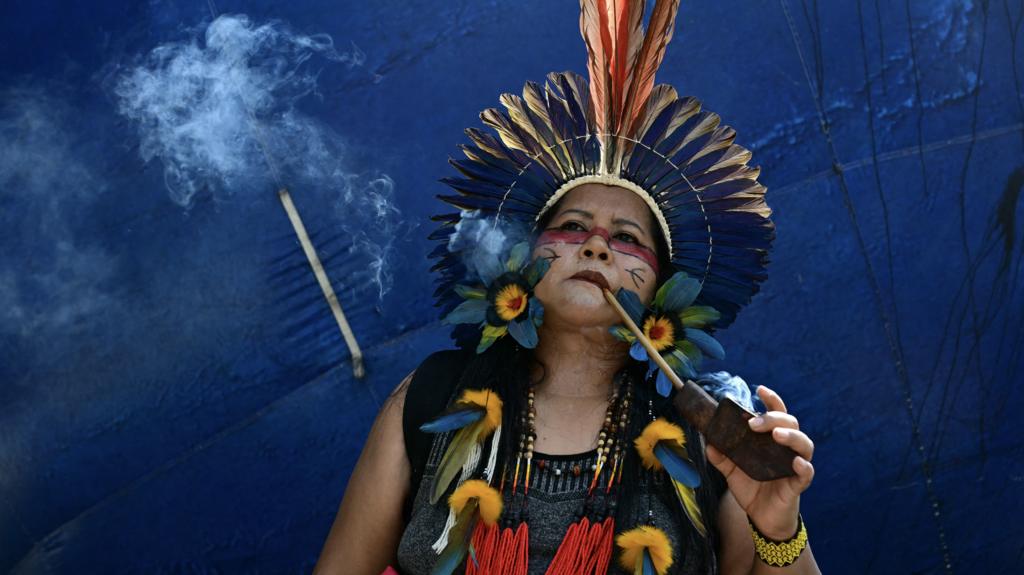“`html
As host of COP30, Brazil has established 10 new Indigenous territories, coinciding with recent protests at the climate summit.
This designation ensures that these areas, including a portion of the Amazon rainforest, will have their culture and environment protected under Brazilian law, although enforcement has been inconsistent.
The action follows similar initiatives by President Luiz Inácio Lula da Silva, whose administration recognized Indigenous ownership of 11 territories last year.
“Each and every indigenous territory in Brazil is a reason to celebrate and is a reason for us to feel happy,” Dinamam Tuxu from the Articulation of Indigenous Peoples of Brazil (APIB) told the BBC at COP30.
The formalization of the latest measure will occur through a presidential decree.
Mr. Tuxu stated that APIB advocates for broader legal recognition of lands, which would empower Indigenous groups to control activities within their borders.
“Indigenous peoples today protect 82% of the world’s biodiversity. If you demarcate indigenous lands, you guarantee this area will be protected,” he said.
“The traditional way of life of indigenous peoples protects the lands and automatically guarantees global warming will be tackled. Consequently the entire humanity benefits from it,” he added.
Some Indigenous groups face attacks when defending their land against cattle ranchers or organizations involved in illegal logging for agriculture.
Survival International reported that on Sunday, an Indigenous leader from the Guarani Kaiowá community in southern Brazil was killed in an attack.
Eyewitnesses told Survival International that Vicente Fernandes Vilhalva, 36, was fatally shot in the head when gunmen surrounded the village.
On Saturday, thousands gathered to protest outside the UN’s annual climate conference, with demonstrators holding signs that read “demarcation now.”
Earlier last week, demonstrators, some from Indigenous groups, breached the summit carrying signs that read “our forests are not for sale” and clashed with security personnel.
Security has been visibly increased around the conference, with a greater presence of armed soldiers and police at the entrance. Many Indigenous groups lack accreditation to enter the premises.
Despite these challenges, this COP has the highest representation from Indigenous groups to date.
“This makes me very happy. We worked for two years and now we have at least 900 people inside the COP where they can negotiate and represent their communities,” Kleber Karipuna, from APIB, told BBC News.
Over 200 human rights organizations addressed a letter to UN officials on Monday, criticizing the heightened security measures as contributing to “an increasing global trend towards the silencing of dissent, militarized response to protest, and marginalisation of those defending land and the environment.”
Past recognition of Indigenous reserves banned mining and logging, as well as restricting commercial farming, in the areas they covered to prevent deforestation.
According to a study by the Articulation of Indigenous Peoples of Brazil, the Amazon Environmental Research Institute, and the Indigenous Climate Change Committee, expanding the total area designated as Indigenous territory could prevent up to 20% of additional deforestation and reduce carbon emissions by 26% by 2030.
These newly protected areas encompass hundreds of thousands of hectares and are inhabited by thousands of people from the Mura, Tupinambá de Olivença, Pataxó, Guarani-Kaiowá, Munduruku, Pankará, and Guarani-Mbya Indigenous peoples.
More than 78% of one area overlaps with the Amazon National Park, a portion of the biodiverse rainforest that plays a critical role in regulating the global climate and storing carbon.
The Brazilian government’s announcement coincided with Indigenous Peoples’ Day at COP30 on Monday.
It was reported that no new Indigenous lands had been declared since 2018, prior to the left-wing Lula’s return to office.
Under his far-right predecessor, Jair Bolsonaro, who promoted mining on Indigenous lands, the protections afforded to them were frequently not enforced.
Lula’s government has previously taken action to drive out illegal miners from indigenous lands.
Currently, Indigenous lands encompass 117.4 million hectares, which is roughly equivalent to the size of Colombia, or approximately 13.8% of Brazil’s territory.
According to the country’s census, hundreds of Indigenous groups reside in Brazil.
The Amazon rainforest is already at risk of a renewed surge in deforestation as efforts grow to overturn a key ban to protect it. Thick and healthy forestry helps pull carbon out of the atmosphere.
Carbon released through the burning of fossil fuels has contributed to climate change.
Countries are convening at COP30 to reach agreements on limiting global average temperature increases to 1.5C above pre-industrial levels and keeping them “well below” 2C.
The UN’s Intergovernmental Panel on Climate Change asserts that extensive scientific evidence indicates that warming of 2C or more would have dire consequences, including extreme heat, higher sea levels, and threats to food security.
Arsenal are set to discover the full extent of the thigh injury suffered by centre-back Gabriel while on international duty with Brazil.
How do you police the world’s biggest tropical rainforest? Faced with deadly violence, indigenous people have set up their own unarmed guard.
Brazilian farmers want to end a ban on planting soya on cleared land, which critics say would spur deforestation.
Arsenal defender Gabriel will miss Brazil’s game on Tuesday after scans confirmed a thigh injury.
Açaí is everywhere, but Brazil hopes more of its fruits rich in antioxidants and fibre will soon be enjoyed around the world.
“`

